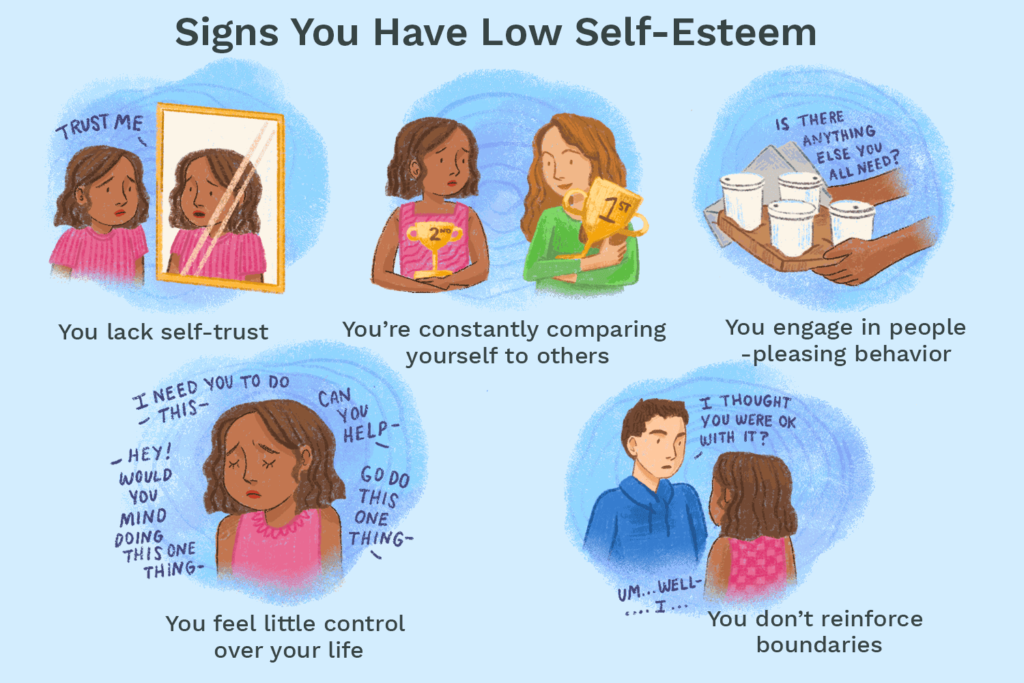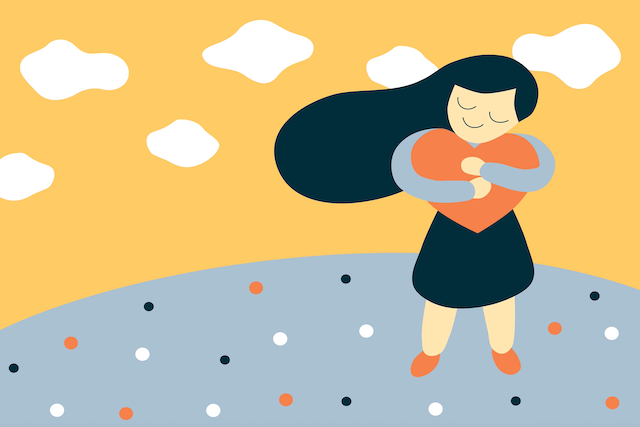
How to Build Self-Esteem: The Ultimate Guide
685331 views
Low self-esteem can negatively affect virtually every facet of your life, including your relationships, your job, and your health.
But you can boost your self-esteem!
Consider these steps, based on cognitive behavioral therapy. But first of all, you have to be aware that low self-esteem could ruin your life.
How Low Self-esteem Can Destroy Your Life

Low self-esteem can reduce the quality of a person’s life in many different ways, including:
- Negative feelings – the constant self-criticism can lead to persistent feelings of sadness, depression, anxiety, anger, shame or guilt.
- Relationship problems – for example, they may tolerate all sorts of unreasonable behavior from partners because they believe they must earn love and friendship, cannot be loved or are not loveable. Alternatively, a person with low self-esteem may feel angry and bully other people.
- Fear of trying – the person may doubt their abilities or worth and avoid challenges.
- Perfectionism – a person may push themselves and become an over-achiever to ‘atone’ for what they see as their inferiority.
- Fear of judgment – they may avoid activities that involve other people, like sports or social events, because they are afraid they will be negatively judged. The person feels self-conscious and stressed around others and constantly looks for ‘signs’ that people don’t like them.
- Low resilience – a person with low self-esteem finds it hard to cope with a challenging life event because they already believe themselves to be ‘hopeless’.
- Lack of self-care – the person may care so little that they neglect or abuse themselves, for example, not sleeping, eating or washing properly.
- Self-harming behaviors – low self-esteem puts the person at increased risk of self-harm, for example, eating disorder, drug or alcohol abuse, or suicide.
7 Signs Of Low Self-esteem

If you’re not quite sure whether or not you have low self-esteem, here are the signs.
- You need validation from others – If someone makes a negative comment or starts criticizing you, you instantly feel like you’re worthless. You feel vulnerable, and it always seems like the person who’s saying the bad stuff about you is right. So you need recognition from others to feel good about yourself.
- You feel inferior to other people – Everyone seems to be doing better than you for some reason. You always feel that everyone’s better than you.
- You always put other people before yourself – Putting people’s needs before your own means that you’re willing to help other people even if you have important things to do, just so they don’t think negatively of you. You do this because you don’t want to be seen as a bad person, so you gladly say yes to everyone because you’re afraid to say no.
- You beat yourself up for small mistakes – You always torture yourself for every single mistake you make and you see them as proof that you’re worthless and not good at anything.
- You overthink what people say – When someone says something bad about you, you’ll spend ages thinking about it. Even after the person who said it totally forgets about it.
- You settle for less than you deserve – You’re settling for mediocrity just because you think you deserve it. You don’t think you deserve to be happy and fulfilled, so you never even bother to look for a way to get there.
- You don’t know how to take a compliment – When you hold so many negative beliefs about yourself for so many years and someone pays you a compliment, it feels like you’re an imposter, like you don’t deserve it.
Causes Of Low Self-esteem
Your base level of self-esteem forms primarily during your developmental years, from young childhood into young adulthood. This is the time in your life when you develop your self-identity and start to form an understanding of how you fit into the larger world.
The experiences you have in your young life can have a lasting effect on how you view yourself. If you didn’t receive enough care or attention as a child, that may translate into feelings of worthlessness as an adult.
Here are some environmental factors that can affect our self-esteem:
- Trauma – Being forced into a physical and emotional position against your will can make it difficult to develop trust, which profoundly impacts self-esteem. Many trauma victims struggle with displaced guilt that can further feelings of shame and low self-esteem. In an effort to gain control of their circumstances, victims can convince themselves that they were complicit or even to blame. This method of coping with abuse can lead to feelings of self-loathing, repulsion, and deep shame.
- Authority Figures in Conflict – When parents or other primary caregivers fight or exhibit negative conflict, it can cause a child or young person to absorb the harmful emotions and distrustful situations that have been modeled for them. It can feel scary, overwhelming, and disorganizing. These experiences as a child can not only cause symptoms of low self-esteem while they’re happening, but also contribute to low self-esteem as an adult.
- Bullying – Being bullied as a child can leave its emotional marks for a long time. When primary caregivers are otherwise occupied during periods of bullying, a child can struggle with feeling undeserving of notice, unworthy of attention.
- Academic Challenges – Those with a history of academic challenges are at risk of suffering from low self-esteem. Feeling incapable of understanding what is happening in the classroom can be paralyzing for a child or teen. The shame of feeling as if you aren’t good enough can be difficult to shake, even after you learn ways to accommodate academic difficulties.
- Society and the Media – It’s no secret that people in the media are packaged and airbrushed into unrealistic standards of physical beauty. Unfortunately, as media access is available at such a young age, small children are exposed to unfair physical comparisons very early, which has been seen to lead to eating disorders and a negative self-image.
We should also note that low self-esteem can develop in adults, too. Dramatic life changes like the end of a serious relationship or the outset of a medical condition can have an impact on our self-worth, no matter what age we are.
How To Improve Your Self-esteem

1. Identify and Challenge Your Negative Beliefs
The first step is to identify, and then challenge, your negative beliefs about yourself.
Notice your thoughts about yourself. For example, you might find yourself thinking ‘I’m not clever enough to do that’ or ‘I have no friends’. When you do, look for evidence that contradicts those statements. Write down both statement and evidence, and keep looking back at it to remind yourself that your negative beliefs about yourself are not true.
2. Identify your competencies and develop them
Self-esteem is built by demonstrating real ability and achievement in areas of our lives that matter to us. If you pride yourself on being a good cook, throw more dinner parties. If you’re a good runner, sign up for races and train for them. In short, figure out your core competencies and find opportunities and careers that accentuate them.
3. Build Positive Relationships—and Avoid Negative Ones
You will probably find that there are certain people—and certain relationships—that make you feel better than others. If there are people who make you feel bad about yourself, try to avoid them.
Build relationships with people who make you feel good about yourself and avoid the relationships that drag you down.
4. Give Yourself a Break
You don’t have to be perfect every hour of every day. You don’t even have to feel good about yourself all the time. Self-esteem varies from situation to situation, from day to day and hour to hour. Give yourself a break. We all have times when we feel a bit down or find it harder to maintain our self-belief.
The key is not to be too hard on yourself. Be kind to yourself, and not too critical.
5. Become More Assertive and Learn to Say No
People with low self-esteem often find it hard to stand up for themselves or say no to others.
This means that they may become overburdened at home or at work because they do not like to refuse anyone anything. However, this can increase stress, and make it even harder to manage. Developing your assertiveness can therefore help to improve your self-esteem. Sometimes acting as if you believe in yourself can actually help to increase self-belief!
6. Improve Your Physical Health
It is much easier to feel good about ourselves when we are fit and healthy.
However, people with low self-esteem often neglect themselves, because they do not feel that they ‘deserve’ to be looked after.
Try getting more exercise, eating well, and getting enough sleep. It is also a good idea to make time to relax and to do something that you want to do, rather than something that someone else expects you to do. You may find that simple changes like this can make a huge difference to your overall outlook.
7. Take On Challenges
People with low self-esteem often avoid challenging and difficult situations. One way to improve your self-esteem can actually be to take on a challenge. This doesn’t mean that you need to do everything yourself—part of the challenge might be to seek help when you need it—but be prepared to try something that you know will be difficult to achieve.
By succeeding, you show yourself that you can achieve. This challenges your negative beliefs and will therefore improve your self-esteem.
The Absolute Best Way to Improve Self-Esteem
Yes, you can try all of these methods, but to get rid of anxiety and improve your self-esteem faster, we recommend seeking support.
We recommend answering our quiz to receive a personalized plan to get rid of your insecurities, build confidence and develop empowering habits.
Personalized solutions will help you build strong self-confidence faster.
Answer a quick quiz and discover which
self-esteem boosting approach suits you best
Subscribe to our mental-health and productivity newsletter where we share tips, news, and ideas.
